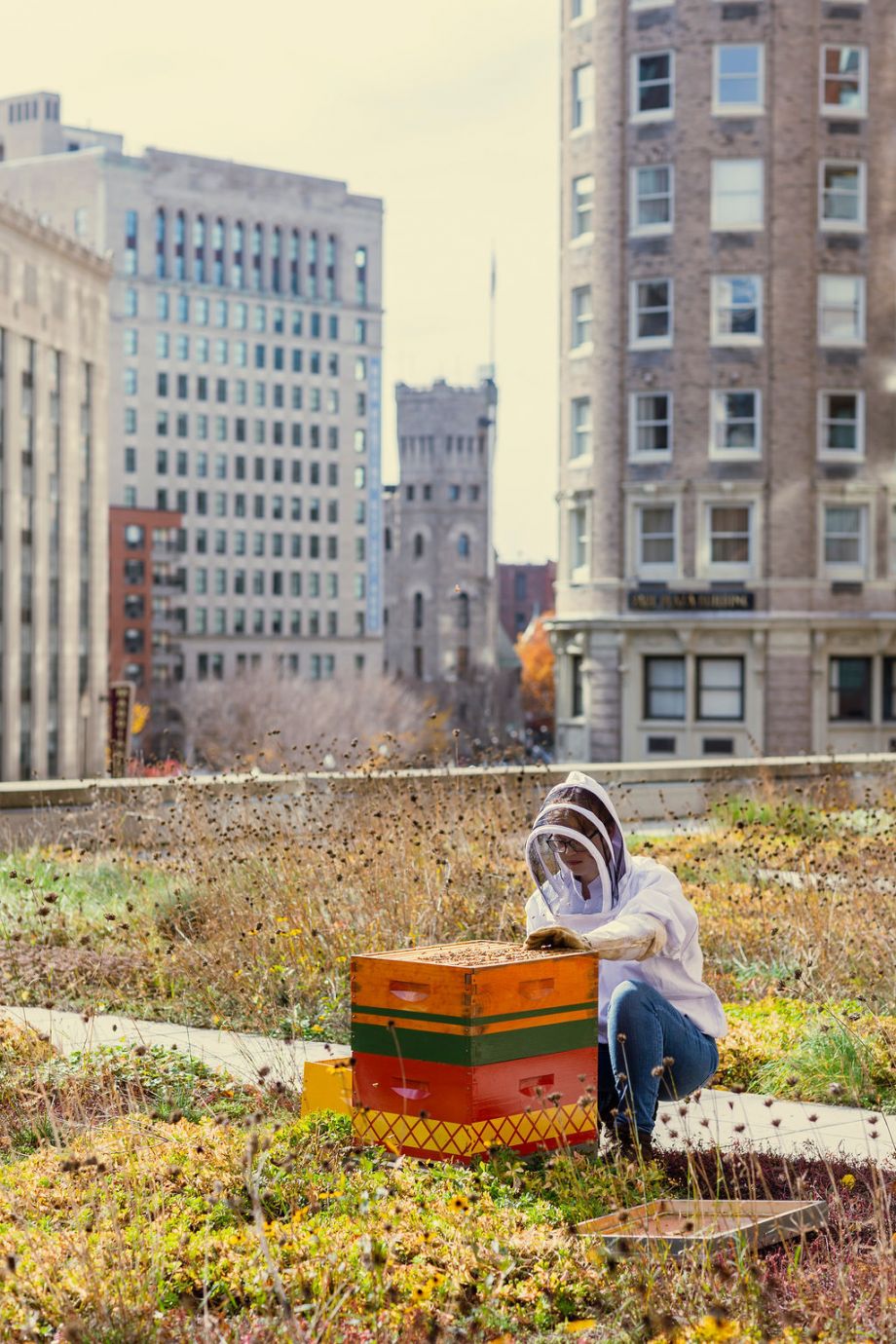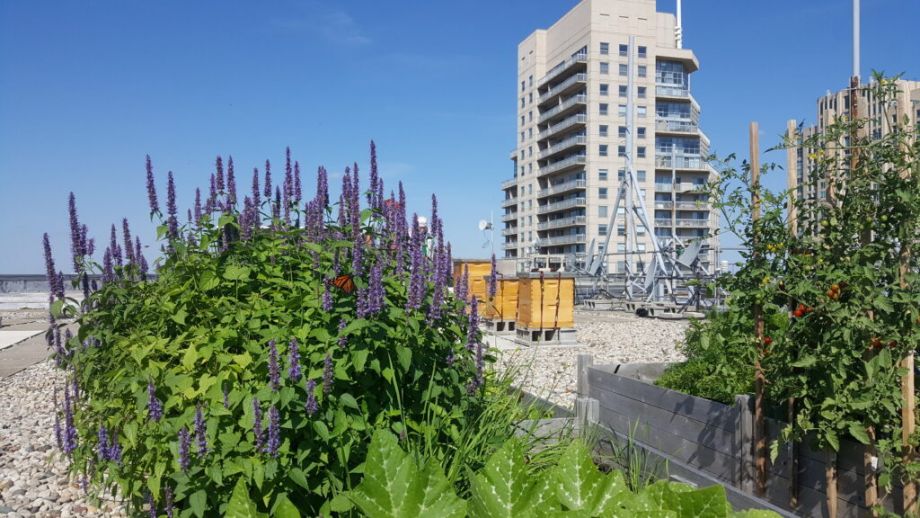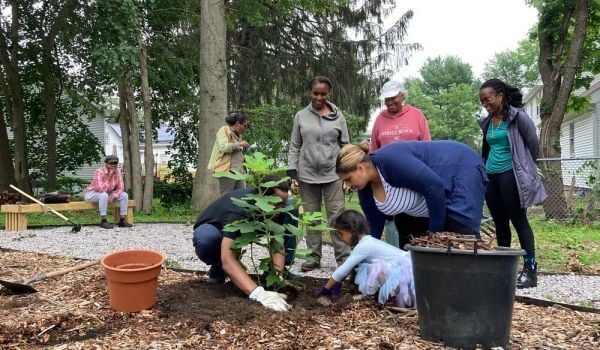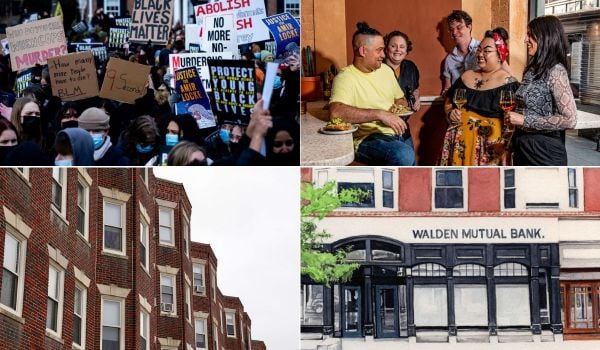Beekeeping has become a trend in cities around the world. It started over a decade ago when struggling bee populations were in the headlines, and colony collapse disorder, a perfect storm of conditions that causes beehives to die off, was a new and growing concern. Bee pollination plays a vital role in global agriculture, accounting for about $15 billion in added crop value in the United States alone. When bee populations are threatened, so are our foodways.
“About 85 percent of flowering plants require an animal to transfer the pollen and to pollinate the flowers,” explains Matthew Shepherd, director of outreach and education at the Xerces Society, an international nonprofit organization committed to the conservation of invertebrates and their habitats.
As conservationists and other scientists raised the alarm over declining pollinator populations, cities responded with urban beekeeping. Organizations like the Xerces Society supported this new interest in urban beekeeping with initiatives like Bee City USA and Bee Campus USA, which provide guidance to cities and college campuses on how to conserve pollinators through the creation of pollinator habitats and reduction of pesticide use. Now, in cities like Seattle, New York and Boston, businesses keep beehives on their rooftops, and residents host them on their balconies, porches or backyards, bringing benefits to pollinators and people alike.
In the United States, Boston was on the cutting edge of the urban beekeeping trend. “Boston is a city of innovation in so many ways and a great place for people who want to help the environment,” says Paige Mulhern, creative director at Best Bees, a full-service beekeeping operation headquartered in Boston.
Noah Wilson-Rich, CEO at Best Bees, also had a lot to do with beekeeping’s rise in Boston. Wilson-Rich was a graduate student studying honeybee immune systems at Tufts University in 2009 when he started Best Bees out of a makeshift lab in his apartment. Within three years, the company had moved into a larger industrial facility and today is responsible for thousands of hives at schools, and commercial and residential locations in 15 cities across the United States.
Businesses in Boston, including the Atlantic Wharf, Beacon Capital Partners and the Taj Hotel, have beehives on their rooftops. The Atlantic Wharf is also home to an 18,000-square-foot rooftop garden planted with native plants, where local bees can collect pollen. The Taj Hotel also has a rooftop garden and serves dessert and cocktails made with in-house honey. Meanwhile, the Boston Museum of Science has an observation hive with glass sides for curious museum-goers to get a glimpse of worker bees in action. Thousands of Boston residents also keep hives at home, with community support and mentorship opportunities provided by the thriving Boston Area Beekeepers Association. Local interest in beekeeping has only increased during the pandemic.

Businesses in Boston, like the Four Seasons, have beehives on their rooftops. (Photo courtesy of Best Bees)
“Out on the farms, there’s a massive amount of bloom for a relatively short period of time, and then after that, there’s not always much bloom because many farmers don’t like weeds or anything else growing around,” explains Shepherd. Once a crop has been harvested, there may not be much food left for honeybees. Having access to only a limited number of crops is also known to affect honeybee immune systems negatively.
On the other hand, cities chock-full of parks, gardens and wild weedy areas offer a variety of foods and a longer period of bloom to foraging honeybees. While honeybees will travel miles for food if they have to, Shepherd says it’s best to have a variety of foods available within a half-mile distance of their hives, and cities can provide that. Bees in Boston might find food in any of its more than 200 parks, tens of thousands of trees lining city streets and more than two dozen protected urban wilds.
Shepherd says that conserving these green spaces is the most important thing cities can do to protect bees of all kinds. (Honeybees may be the most common on Boston rooftops, but there are more than 3,600 species of native bees in the United States.) “For bee conservation, we [need to] focus on creating more habitat because that will support more bees,” he says.
Bee habitats must include flowers, which provide the nectar and pollen they need, and shelter or nesting opportunities. Many species of bees nest in the ground and need open patches of bare soil, while others prefer tunneling into dead wood, stems or twigs. Some city pollinator gardens use specially designed bug hotels to provide nesting space.
Pollinator habitats also have positive effects on other city-dwelling wildlife and people. “One of the best ways that we might have of ameliorating the impacts of climate change is by ensuring that there is good habitat available,” says Shepherd. “It does act as a carbon sink, and within cities, more vegetation helps to reduce temperature and urban heat island.”
The power of beekeeping in cities like Boston, Mulhern says, “is that as we really imagine our cities as better places for bees, we can really imagine our cities as better places for people.”

















